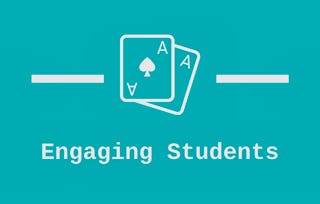Gamification is the application of game elements and digital game design techniques to non-game problems, such as business and social impact challenges. This course will teach you the mechanisms of gamification, why it has such tremendous potential, and how to use it effectively. For additional information on the concepts described in the course, you can purchase Professor Werbach's book For the Win: How Game Thinking Can Revolutionize Your Business in print or ebook format in several languages.

Gamification

2,448 reviews
Skills you'll gain
Details to know

Add to your LinkedIn profile
See how employees at top companies are mastering in-demand skills

There are 6 modules in this course
Gamification is a new field, but games are ancient. In this first module, we'll look at what gamification is, why organizations are applying it, and where it comes from. While there isn’t universal agreement on the scope of the field, a set of concepts are clearly representative of gamification. The second lesson explains why the concept of games is deeper than most people realize, and how game design serves as a foundation for gamification.
What's included
12 videos1 reading2 assignments
What exactly does it mean to apply game design principles in non-game contexts? In this module, we'll discuss how game designers approach their craft, and how to see any situation through the lens of game design. Then we'll examine the raw materials of games and gamification, known as game elements. We'll earn how to break down a game into its constituent parts and apply them to create gamified systems.
What's included
11 videos2 assignments1 peer review
Gamification is a technique for motivation, so it ties very directly into psychology. This unit introduces the major psychological concepts relevant to gamification. The first lesson focuses on behavioral approaches and reward design; the second identifies the risks and alternatives to this approach.
What's included
10 videos2 assignments1 peer review
Gamification done well is a form of design. This module describes the design process, and provides a six-step framework to apply to any gamification project. The second lesson identifies important considerations and options for developing creative, human-centered, thoughtful gamification solutions.
What's included
10 videos1 reading2 assignments
This module describes particular challenges and opportunities when applying gamification in two contexts: within an organization, and in social impact or behavior change environments.
What's included
11 videos1 reading1 assignment1 peer review
There are many legitimate limitations, concerns, and dangers from gamification. Some of them can be avoided through thoughtful design, but others must be considered directly in any implementation. The final lesson details gamification-related techniques that go beyond those covered throughout the course, and concludes with a look toward the future.
What's included
11 videos2 assignments
Instructor

Offered by
Explore more from Design and Product
 Status: Preview
Status: PreviewErasmus University Rotterdam
 Status: Free Trial
Status: Free Trial Status: Free Trial
Status: Free Trial
Why people choose Coursera for their career

Felipe M.

Jennifer J.

Larry W.

Chaitanya A.
Learner reviews
- 5 stars
82.36%
- 4 stars
14.33%
- 3 stars
2%
- 2 stars
0.65%
- 1 star
0.65%
Showing 3 of 2448
Reviewed on Sep 23, 2017
Amazing course, opens up your eyes and makes you realise that bagdes that you get on some website is a clever gamification trick to keep you engaged! Nice and interesting course!
Reviewed on Mar 8, 2018
That's super cool. Exceed my expectation 200%. My most valuable take away are self-determination theory, flow, importance of intrinsic motivation, and design framework. Thanks a lot!
Reviewed on Jun 24, 2020
Very thorough and enlightening course. I like the level of depth and the various examples.The tests are very confusing, I would use less multiple choice answers or reduce a bit the threshold.

Open new doors with Coursera Plus
Unlimited access to 10,000+ world-class courses, hands-on projects, and job-ready certificate programs - all included in your subscription
Advance your career with an online degree
Earn a degree from world-class universities - 100% online
Join over 3,400 global companies that choose Coursera for Business
Upskill your employees to excel in the digital economy
Frequently asked questions
To access the course materials, assignments and to earn a Certificate, you will need to purchase the Certificate experience when you enroll in a course. You can try a Free Trial instead, or apply for Financial Aid. The course may offer 'Full Course, No Certificate' instead. This option lets you see all course materials, submit required assessments, and get a final grade. This also means that you will not be able to purchase a Certificate experience.
When you purchase a Certificate you get access to all course materials, including graded assignments. Upon completing the course, your electronic Certificate will be added to your Accomplishments page - from there, you can print your Certificate or add it to your LinkedIn profile.
Yes. In select learning programs, you can apply for financial aid or a scholarship if you can’t afford the enrollment fee. If fin aid or scholarship is available for your learning program selection, you’ll find a link to apply on the description page.
More questions
Financial aid available,
¹ Some assignments in this course are AI-graded. For these assignments, your data will be used in accordance with Coursera's Privacy Notice.


